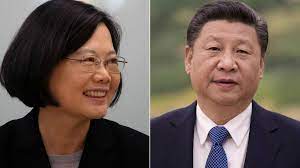
China-Taiwan Ties
China-Taiwan Ties
GS-II: International Relations (IR)
(UPSC/State PSC)
Important for Prelims:
Taiwan's Newly elected president William Lai, China-Taiwan relations, One China policy, China-Taiwan civil war, Taiwan Semiconductor Manufacturing Corporation (TSMC), Russia-Ukraine conflict.
Important for Mains:
Background of Conflict between China and Taiwan, Implications of China-Taiwan Crisis, Exercises Countering China, Strategic and Defence Support to Taiwan by US, India’s Stand on the Issue, way forward, Conclusion.
January 29, 2024
Why in News:
Recently, anti-China candidate William Lai has won Taiwan's presidential election.
- He defeated Hou Yu-ih of the Kuomintang Party and Ko Wen-je of the Taiwan People's Party.
- Taiwan's relations with China are expected to deteriorate further after William Lai's victory.
- It is notable that China-Taiwan relations have been tense for years over sovereignty.
Implications of China-Taiwan Crisis:
- Taiwan is the world’s leading chipmaker, and home to Taiwan Semiconductor Manufacturing Corporation (TSMC), which holds 90% of the market for advanced chips that power computers and phones. Disruption in the exports of chips will lead to global shortage of electronic goods and appliances, automobiles and other manufacturing industries dependent upon semiconductor chips.
- It will lead to militarization of the region. China has started its military operations against Taiwan while the U.S stationed four warships close to the East of Taiwan. The intensification of the situation may invite more players to the conflict and fuel more militarization.
- Any extreme military action and forced annexation attempt might result in a Russia-Ukraine-like conflict. This will be detrimental for the global economy, which is already facing recession fears amid the war in East Europe.
- India’s trade with Taiwan has risen rapidly in the last decade. India imports iron and Steel, electrical machinery, electronics and chemicals among other things from Taiwan. Disruption in the India-Taiwan trade and a global recession will further add to domestic inflation and slowdown economic growth.
Background of Conflict between China and Taiwan:
- China and Taiwan separated amid civil war in 1949 and China considers Taiwan part of its territory to be taken control of by force if necessary. But Taiwan's leaders say that Taiwan is a sovereign state.
- After decades of hostile intentions and angry rhetoric, relations between China and Taiwan started improving in the 1980s. China put forward a formula, known as "one country, two systems", under which Taiwan would be given significant autonomy if it accepted Chinese reunification.
- In Taiwan, the offer was rejected, but the government did relax rules on visits to and investment in China.
- There were also limited talks between the two sides' unofficial representatives, though Beijing's insistence that Taiwan's Republic of China (ROC) government is illegitimate prevented government-to-government contact.
- China's implementation of a national security law in Hong Kong in 2020 was seen by many as yet another sign that Beijing was becoming significantly more assertive in the region.
Exercises Countering China:
- Recently, the US has announced a new trilateral security partnership for the Indo-Pacific, between Australia, the UK and the US (AUKUS), which is also seen as an effort to counter China.
- Malabar Exercise (US, Japan, India and Australia) is also a major step towards building a sustainable Indo-Pacific coalition thereby addressing the massive strategic imbalance generated by an economically and militarily powerful China.
Strategic and Defence Support to Taiwan by US:
- Taiwan has sought to improve its defenses with the purchase of US weapons, including upgraded F-16 fighter jets, armed drones, rocket systems and Harpoon missiles.
- A US aircraft carrier group led by the warship Theodore Roosevelt has entered the South China Sea to ensure freedom of the seas, and build partnerships that foster maritime security.
India’s Stand on the Issue:
- Since 1949, India has accepted the “One China” policy that accepts Taiwan and Tibet as part of China.
- However, India uses the policy to make a diplomatic point, i.e., if India believes in “One China” policy, China should also believe in a “One India”policy.
- Even though India has stopped mentioning its adherence to One China policy in joint statements and official documents since 2010, its engagement with Taiwan is still restricted due to the framework of ties with China.
- India and Taiwan do not have formal diplomatic relations but since 1995, both sides have maintained representative offices in each other’s capitals that function as de facto embassies.
Way Forward:
- India should try its best to be a part of all efforts to de-escalate the crisis without getting caught in the whirlpool of the China-Taiwan crisis.
- Greater economic partnership with Taiwan should be followed up by encouraging the domestic manufacturing sector, removing all impediments, liberalizing tax laws and strengthening the supply chain mechanism.
- some foreign policy experts argue that India must be more forthright in its criticism of Chinese aggression on India’s borders. A small nation like Taiwan withstood immense pressure and went ahead with the Speaker’s visit with high-profile meeting. India on the other hand, continues to downplay border stand-off with China domestically as well as at international fora. The fear of disruption in economic ties may be unfounded, as China is stand to lose more than India if trade ties are cut-off.
- India should also focus on finding alternate destinations of critical import/export items that are traded with Taiwan as escalation of conflict can choke the supply. Amongst them, the most critical item is semiconductor chips.
Conclusion:
India and other powers must draw a redline for any Chinese effort to take Taiwan by force. That is, international community, it is vital to consider the meaning of isolation of Taiwan. It means an aggressive and emboldened China and greater chances of China invading Taiwan. This situation can’t be beneficial for geo-political stability of the region and maintenance of international order.
Source: Indian Express
----------------------------------------------
Mains Question:
What are the implications of the growing crisis in China-Taiwan relations? Discuss India's strategic measures to avoid the impact of the China-Taiwan crisis.